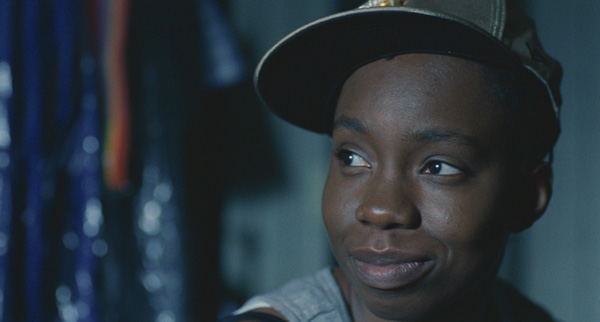
Adepero Oduye as Alike (Focus Features)
Every year another indie could be the last one ever shot on film. But 35mm keeps hanging on, and beautifully so in Dee Rees’s Sundance darling. Memorable performances from a young cast bring to life the heart-rending story of Alike (Adepero Oduye), a 17-year-old lesbian growing up in a socially conservative black family. Of all the reasons to see this in select cities while you can, Bradford Young’s award-winning visuals is one of them. The winner of last year’s cinematography award at Sundance, Pariah features some of the most skillful work you’ll see this year.
Young frames the actors up close like a Dardenne brothers film, while avoiding claustrophobia with consistently smart camera work. There are no complicated visual moves, nor are there dramatic panoramas, and you won’t find any grand set pieces. What you will find are masterfully evocative low-lit sequences and great poster moments, such as Lee’s ride home under the fluorescent lights of the city bus. Also, it’s 35mm. If you shoot it, they will come.
Oduye and Pernell Walker are naturals as Alike (nicknamed Lee) and Laura, best friends with two very different upbringings. Lee’s overprotective mother (Kim Wayans) widens a rift in denying Lee’s increasingly obvious sexual orientation (“God doesn’t make mistakes,” she tells her obstinate daughter, attempting to scare her straight), while Laura’s mother refuses to even speak to her. Rees’s heartfelt, if well-trod, script shows us not only Lee’s specific struggles with homosexuality in a close-minded household, but the commonalities in most teens. Lee lives in a brownstone in Brooklyn, but this could easily take place anywhere in the country. The trials that she and her family face are not unlike those of any community, and this is largely a film about what it means to grow up with adversity, gay or straight.
A particular standout is TV veteran Charles Parnell as Lee’s caring yet often imperious police detective father, Arthur. He plays this type to a tee. Arthur behaves like the stern father he believes he’s supposed to be, yet has such repressed emotion that seeing his eldest daughter grow up in front of him only brings him pain. His conflict—he’s perpetually unsure whether to befriend Lee or discipline her—will stay in your mind. By the end, after all of Lee’s fights with her frustrated mother, it’s still Arthur’s word of approval that we wait on.
I won’t spoil it, because you should see this and cry as much as I did, but I’m still waiting for Arthur’s word of approval. Not necessarily from him but from the millions like him. What is great about Pariah is that however clichéd the script may be (teen overcomes adverse conditions at home to follow her dreams), it’s all about our own lives. Clichés are there for a reason, and Pariah is the best example you could ask for. If a script feels predictable, yet evokes emotion at all the right moments; if it tells a story you’ve heard before, yet feels true, then the film is doing something right. There are kids with adversity all over, still waiting for the Arthurs of the world to open up their hearts in acceptance.
















Leave A Comment